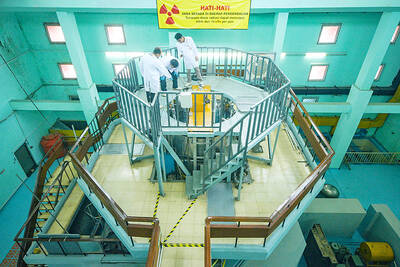Top officials from Cambodia's Khmer Rouge tribunal traveled for the first time to the regime's former stronghold yesterday to allay fears of mass arrests of former rebels.
Judges investigating the murderous Khmer Rouge regime joined other court officials for the three-day visit to the western Pailin region to "meet and talk" with former rebels, tribunal spokesman Reach Sambath said.
"The aim of the meetings is to explain to them about the role of tribunal and its mandate -- ?that this court will only try the most senior and the most responsible Khmer Rouge leaders, and the ordinary Khmer Rouge officials should not be worried," he said.
The visit also aimed to clear up misunderstandings about the joint Cambodian-UN tribunal in the hope of convincing many of the rebels to give evidence for the prosecution in upcoming trials, Reach Sambath said.
"We need cooperation from many of them because they could be key witnesses in order to assist the trials," he said.
Pailin, near the Thai border, was one of the final refuges of the brutal regime which was driven out of power in 1979, and many soldiers and officials fled to the remote region to regroup and try and battle the new government.
Up to two million people died of starvation, overwork or were executed under the Khmer Rouge, which emptied Cambodia's cities, exiling millions to vast collective farms in a bid to forge an agrarian Utopia.
The tribunal, established in July 2006 after nearly a decade of negotiations between Cambodia and the UN, seeks to prosecute crimes committed by senior Khmer Rouge leaders.
Five former top Khmer Rouge leaders have been detained to face charges for crimes committed during the regime's 1975 to 1979 rule. Trials are expected to begin in the middle of this year.
All the defendants claim to be suffering from serious health ailments, causing concern among those hoping to find justice before the alleged perpetrators die.

Four people jailed in the landmark Hong Kong national security trial of "47 democrats" accused of conspiracy to commit subversion were freed today after more than four years behind bars, the second group to be released in a month. Among those freed was long-time political and LGBTQ activist Jimmy Sham (岑子杰), who also led one of Hong Kong’s largest pro-democracy groups, the Civil Human Rights Front, which disbanded in 2021. "Let me spend some time with my family," Sham said after arriving at his home in the Kowloon district of Jordan. "I don’t know how to plan ahead because, to me, it feels

Poland is set to hold a presidential runoff election today between two candidates offering starkly different visions for the country’s future. The winner would succeed Polish President Andrzej Duda, a conservative who is finishing his second and final term. The outcome would determine whether Poland embraces a nationalist populist trajectory or pivots more fully toward liberal, pro-European policies. An exit poll by Ipsos would be released when polls close today at 9pm local time, with a margin of error of plus or minus 2 percentage points. Final results are expected tomorrow. Whoever wins can be expected to either help or hinder the

North Korea has detained another official over last week’s failed launch of a warship, which damaged the naval destroyer, state media reported yesterday. Pyongyang announced “a serious accident” at Wednesday last week’s launch ceremony, which crushed sections of the bottom of the new destroyer. North Korean leader Kim Jong-un called the mishap a “criminal act caused by absolute carelessness.” Ri Hyong-son, vice department director of the Munitions Industry Department of the Party Central Committee, was summoned and detained on Sunday, the Korean Central News Agency (KCNA) reported. He was “greatly responsible for the occurrence of the serious accident,” it said. Ri is the fourth person

SKEPTICAL: Given the challenges, which include waste disposal and potential domestic opposition, experts warn that the 2032 nuclear timeline is overambitious Indonesia is hoping going nuclear can help it meet soaring energy demand while taming emissions, but faces serious challenges to its goal of a first small modular reactor by 2032. Its first experiment with nuclear energy dates to February 1965, when then-Indonesian president Sukarno inaugurated a test reactor. Sixty years later, Southeast Asia’s largest economy has three research reactors, but no nuclear power plants for electricity. Abundant reserves of polluting coal have so far met the enormous archipelago’s energy needs, but “nuclear will be necessary to constrain the rise of and eventually reduce emissions,” said Philip Andrews-Speed, a senior research fellow at the